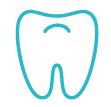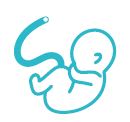What are Stem Cells?
Stem cells are specialised cells which have the ability to replicate and transform into a range of different tissue and organ specific cell types. Stem cells, because of these abilities, can act as a repair system for the body.
Stem cells are specialised cells which have the ability to replicate and transform into a range of different tissue and organ specific cell types. Stem cells, because of these abilities, can act as a repair system for the body.
There are four main types of stem cells which have the potential to play different roles in stem cell therapies. These include:
 Tooth stem cells Found in the soft tissue at the centre of our teeth. Baby teeth that naturally fall out provide a pain free, non-invasive source of stem cells.
Tooth stem cells Found in the soft tissue at the centre of our teeth. Baby teeth that naturally fall out provide a pain free, non-invasive source of stem cells.
 Cord Blood stem cells Derived from the blood inside umbilical cords just after birth providing a relatively small number of stem cells available for therapeutic use.
Cord Blood stem cells Derived from the blood inside umbilical cords just after birth providing a relatively small number of stem cells available for therapeutic use.
![]() Bone Marrow stem cells Harvested from femoral (hip) bone marrow. An invasive process often requiring a general anaesthetic.
Bone Marrow stem cells Harvested from femoral (hip) bone marrow. An invasive process often requiring a general anaesthetic.
![]() Embryonic stem cells Often labelled as controversial, due to the ethical implications of using embryos. Extracted from early stage embryos & developed in the lab.
Embryonic stem cells Often labelled as controversial, due to the ethical implications of using embryos. Extracted from early stage embryos & developed in the lab.
![]() Also developed in the lab are induced Pluripotent stem cells(iPSC’s). iPSC technology has not yet advanced to a stage where therapeutic transplants have been deemed safe, iPSCs are being used in drug discovery efforts and to further the understanding of the basis of disease.
Also developed in the lab are induced Pluripotent stem cells(iPSC’s). iPSC technology has not yet advanced to a stage where therapeutic transplants have been deemed safe, iPSCs are being used in drug discovery efforts and to further the understanding of the basis of disease.
The stem cells we isolate from teeth are known as Mesenchymal stem cells. They are not isolated from the blood in the tooth but from other tissue contained within the tooth itself. These cells do not have the same limitations as blood stem cells. Mesenchymal stem cells can form many different types of tissues, and therefore offer the possibility of therapy for many different types of diseases and conditions. These cells can also be safely expanded in a lab, so you are not limited to the number that was isolated thereby supplying sufficient material for multiple therapies on adults.
Click here for more information on potential treatment areas.
Autologous stem cell transplant means that the donor receives their own stem cells. There are many advantages of autologous transplant including; no immune reaction and tissue rejection of the cells, no immunosuppressive therapy needed, and significantly reduced risk of communicable diseases.
Allogeneic stem cell transplant means that the cells have been donated by a third party. The patient therefore will not receive their own cells if a transplant is ever needed. There are therefore additional challenges in matching donors and risks surrounding possible rejection of donated cells.
Click here for more information on possible treatment areas.